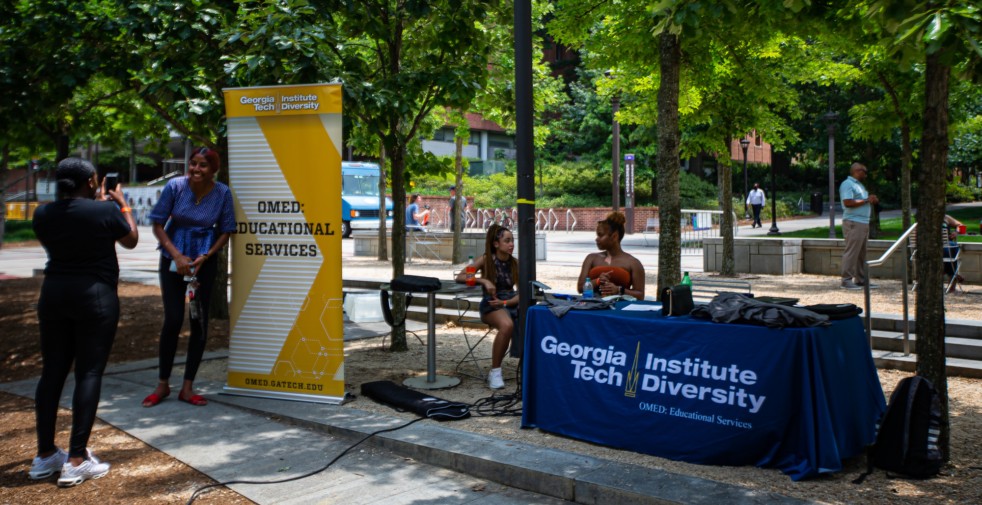Juneteenth is a nationally celebrated commemoration of the end of slavery in the United States and dates back to June 19, 1865, when Union troops arrived in Galveston, Texas and announced enslaved people were freed.
This was over two years after the Emancipation Proclamation freed enslaved people in the Confederate states, but it could not be enforced throughout Texas until the Civil War ended.
The first Tech Juneteenth Commemoration event took place on June 18, with the Office of Minority Educational Development (OMED) and three Black student organizations (BSOs) including the African American Student Union (AASU), African Student Association (ASA) and the Caribbean Student Association of Georgia Tech (GT CaribSA) hosting a day of hybrid activities.
The event began with a virtual talk featuring Associate Professor André Brock from the School of Literature, Media and Communication.
Brock, who has an M.A. in English and Rhetoric from Carnegie Mellon University and a Ph.D. in Library and Information Science from the University of Illinois at Urbana-Champaign, used the context of his research on Black online identity to discuss Juneteenth’s history and to relate it to events in 2021.
“I argue from my perspective as a Information Studies researcher that Juneteenth is actually commemorating an episode of disinformation,” Brock said.
He continued that disinformation is something Black and minority communities have faced since the beginning of this country, including in public policy, news articles and church sermons.
The Emancipation Proclamation, issued by President Abraham Lincoln in 1862 and effective starting on Jan. 1, 1863, freed enslaved people in the Confederate States of America, but not the entire United States, including in the border states of Delaware, Kentucky, Maryland and Missouri.
“Myths about Lincoln, the Republican Party and American democracy in general promote this proclamation as altruistic and moral, but in truth, it was a military and political propaganda effort to sow discord behind enemy lines,” Brock said.
Brock continued that Texas was not the last state to free enslaved people.
In fact, Delaware and Kentucky did not free enslaved populations until December 1865, which was when the 13th Amendment was ratified.
Brock related this to the recent creation of a federal holiday for Juneteenth.
“The creation of a federal holiday to mark a successful historical disinformation campaign is kind of what America does,” Brock said.
“It’s more of a DEI [Diversity, Equity and Inclusion] initiative than actual redress.”
Namely, this does not enact any tangible policy changes to support Black Americans.
“Considering that our people have built this nation, but we still haven’t been offered reparations, much less a bill through this current Congress to address anti-Black policing strategies that have ended in the murders of George Floyd, Breonna Taylor, Ahmaud Arbery here in Georgia, Rayshard Brooks here in Atlanta and many more,” Brock said.
After Brock’s presentation, attendees asked Brock about his thoughts on Juneteenth being made a federal holiday, just several days after the Georgia Board of Education passed a resolution that supports banning Critical Race Theory from Georgia public schools for kindergarten through twelfth grade.
The resolution does not currently apply to higher education, including Tech.
“I will teach about diversity, equity and social justice in the classroom and doing that without critical race robs me of a crucial tool that I need,” Brock said.
Other attendees asked Brock if Juneteenth’s status as a federal holiday would force schools to change their curriculum to include teachings about events traditionally left out of the history curriculum, or if more would need to be done.
Brock mentioned examples of racist violence such as the Tulsa Race Massacre in 1921 and the Rosewood Massacre in 1923.
“Institutionally, systematically, structurally it’s not going to happen anytime soon, but we will continue to fight to try to get these things entered into the curriculum so that people can learn,” Brock said.
Brock was also asked about his thoughts on the commodification of Juneteenth and movements to shop at and support only Black-owned businesses and vendors for the day.
“The idea that Black businesses will benefit from Juneteenth is a good one,” Brock said.
“The ways that they can benefit though, is severely constrained by the way racial capitalism keeps them from being able to take advantage of networks of distribution, of marketing, of product fulfillment, of shipping and everything else.”
Brock explained that he aligns theoretically and morally with Afro-optimism, as opposed to Afro-pessimism.
“Blackness, by the theoretical framework of Afro-pessimism, is incommensurable with Western society and culture,” Brock said, later explaining that Afro-optimism celebrates Black thought in the context of modernity and capitalism.
At the end of Brock’s presentation, he mentioned how Black joy, which gives a capacity for self-care, is necessary to fight oppression.
This idea is further explored in his book, “Distributed Blackness: African American Cybercultures.”
“We must hold space for things that bring us life and joy in order to later navigate things that will give us trouble,” Brock said.
After the virtual portion ended, the event moved to the Tech Green.
Two fraternities, Omega Psi Phi and Phi Beta Sigma, and two sororities, Delta Sigma Theta and Zeta Phi Beta, tabled at the event.
There were interactive activities including games, food and a student performance.
A full recording of the virtual talk can be accessed at youtube.com/watch?v=p8zc4Vzg_vM.
